ANNUAL REPORT 2016–2017






2016–2017 was a pivotal year marked by positive energy, incredible engagement and exceptional growth at the International Bureau for Children’s Rights The organisation has expanded its geographic reach and increased the number and variety of our projects and initiatives
This growth, which was led by our director general and supported by the engagement and strengthening of our teams, spurred the IBCR to adopt a common vision and approach As a group, we developed new procedures, standards and tools, in addition to implementing mechanisms to ensure accountability, tracking and assessments with a view to building a culture based on continuous learning
This buoyancy was wholeheartedly supported by our board of directors, which was renewed last year Its members offer a wealth of varied experience gained in different fields and regions, but they share the same level of commitment to protecting the rights of the child Well aware of the challenges and opportunities associated by the IBCR’s sustained growth, the board of directors updated its structure and adopted new work methods, rules and principles based on the notions of quality, efficiency, good governance and transparency
I would like to salute the hard work and dedication of the entire IBCR team, including the members of the board, the director general and our head office and field personnel
I would also like to express my appreciation for the work carried out by our teams Their efforts have positioned the IBCR as a reference organisation guided by the principles set out in the Convention on the Rights of the Child about bolstering child protection systems, promoting child rights and advocating for them
Najat Maalla M’Jid President of the International Bureau for Children’s Rights

Pursuing the IBCR’s technical mandate is an exciting challenge . After all, it involves strengthening the capacities of individuals who are tasked with promoting and protecting children’s rights For the past 23 years, the IBCR has been offering assistance to professionals from around the world while helping them make concrete and sustainable changes to their practices concerning children’s rights The IBCR works hard to rise to this challenge every day by obtaining measurable results, such as publishing an analysis of the child justice system in Angola, certifying police instructors in Afghanistan, adding permanent courses on children’s rights into the training programmes for police, gendarmes and social workers in Togo, preparing recommendations on how to improve the treatment of child victims and witnesses of crime by legal stakeholders in Québec, and holding six consultations in Madagascar to ultimately implement actions aimed at fighting child abuse
The IBCR’s service offer has expanded since 2015 In addition to offering targeted support to its various partners, the IBCR now implements multi-sector and multi-year initiatives directly to strengthen child protection systems Thanks to backing from Global Affairs Canada, the Québec International Development Programme and UNICEF, the IBCR has sent teams to Burkina Faso, Costa Rica, the Democratic Republic of Congo and Honduras with a view to supporting major reforms in their specifications, processes, standard operating procedures, data management systems and training programmes for security forces, social workers and justice personnel . Operating with Lawyers Without Borders, the IBCR sends volunteers to dozens of countries to support civil society organisations that wish to improve and enhance the professionalism of their child protection work
IBCR experts have assisted with legal reforms related to children’s rights in Benin, Côte d’Ivoire, Chad, Morocco, Peru, and Tunisia They also helped the United Nations’ Department for Peacekeeping Operations adopt new standardised training programmes on child protection, and provided training to Canadian government employees who oversee child rights initiatives or who promote international standards on child protection within the formal and informal sectors Working with UNICEF, Terre des hommes and Service Social International, the IBCR developed new inter-agency standards for performing quick assessments of child justice in emergency situations, as well as multi-agency standards on the key skills that child protection social workers require
With a renewed board of directors, the IBCR developed the framework for new guidelines concerning child participation in areas that concern them These guidelines will be implemented in 2018 A new 2017–2020 strategic plan was drafted and a new finance and operations management system is progressively being rolled out to improve our efficiency Initial studies on the IBCR’s programmes have begun in Côte d’Ivoire and similar evaluations are planned for our work in Burundi and Niger The findings from these assessments will inform the IBCR’s continuous improvement efforts and overall approach Already, we have learned that several years after completing the capacity-building cycle, the people involved continue to use the tools that were developed and that long-lasting changes persist in their attitudes toward child protection and related approaches As a result, they are ambassadors of these child-friendly practices and role models for their peers
Following a year marked by learning and skill development, the IBCR is now better prepared to continue growing and developing as a singular, innovative and relevant organisation
Guillaume Landry Director GeneralFounded in 1994, the International Bureau for Children’s Rights — the “Bureau” or “IBCR” — is an international non-governmental organisation that has special consultative status with the Economic and Social Council of the United Nations (ECOSOC)
Driven by the desire to build a world in which children’s rights are fully respected, the IBCR helps promote and protect these rights while remaining true to its values of responsibility, collaboration and respect Wherever we intervene, we adapt our work methods to the local context and the needs of our partners We aim to leverage local knowledge and foster child participation with a view to creating a lasting impact .
The IBCR’s headquarters are in Montréal, where some 30 professionals, backed by qualified interns, provide technical expertise to child intervention experts in Africa, the Americas, Asia and the Middle East We also operate four satellite offices in Burkina Faso, Costa Rica, the Democratic Republic of Congo and Honduras Here, field coordinators and agents work alongside our partners The IBCR team also includes Canadian volunteers who are deployed to the Caribbean, Latin America and West and North Africa
Children are full legal persons Children have the right to express their views, to learn, to live free of all forms of violence, exploitation, abuse and negligence Children have the right to have their best interest taken into consideration whenever decisions are made about them, directly or indirectly The IBCR’s mission is to contribute to the respect and promotion of children’s rights, in accordance with the commitments outlined in the Convention on the Rights of the Child and its optional protocols .
As a centre of technical expertise in children’s rights, the IBCR endeavours to strengthen the capacities of those who work directly with children by sharing knowledge and best practices or by developing tools and reference guides The IBCR collaborates with social workers, members of security and defence forces, legal representatives, NGOs, government agencies and the formal and informal private sectors, with a view to helping them adopt childfriendly practices The IBCR’s expertise also lies in raising awareness about children’s rights to persuade decision makers to adopt laws and programmes that more effectively hold the rights of the child

The IBCR aims to protect the rights and dignity of children involved in its interventions In everything the IBCR does, the organisation applies measures to ensure confidentiality, whistleblowing and access to justice while taking into account the physical and mental health of children
The IBCR values the right of girls and boys to express their views freely and to be actors in their own development, while taking into account their developmental capabilities, well-being and best interest
The IBCR believes that all children have equal rights, and our programmes aim to promote participation and equality between girls and boys
The IBCR uses a rights-based approach to ensure that children are treated like full subjects of the law and that their rights are respected in accordance with their capacities, and not like beneficiaries with needs to be met This approach is based on the concept of stakeholder empowerment, which makes it possible to identify the obligations of governments and institutions responsible for implementing legislative, political, economic, social and cultural actions




The IBCR believes that strengthening the protection system by professionalising practices and standardising interactions between children and system stakeholders is the most sustainable and effective approach, and provides a holistic view of the child’s environment
Four members of the IBCR’s board of directors stepped down this year, but only after leaving an indelible mark on the organisation . The IBCR wishes to thank Mary-Anne Kirvan, Benoît Van Keirsbilck, Richard Thérien and Jean-Pierre Rosenzweig for their outstanding work Mr Rosenzweig was the president of the IBCR for more than 15 years, during which time the IBCR grew significantly and successfully implemented large-scale, innovative projects While he was at the helm, the organisation’s notable achievements included preparing the Guidelines on Justice Involving Child Victims and Witnesses of Crimes , which were adopted by the United Nations, developing national profiles on the status of children’s rights, providing lasting capacity building for national stakeholders working in child protection, organising projects to fight child sexual exploitation in the travel and tourism industry, setting up the IBCR’s first volunteer programme, and opening three satellite offices in Africa and Latin America All of this has helped make the IBCR the major international organisation that we know today
The IBCR would like to extend a very special thank-you to these outgoing directors for their involvement and unwavering dedication to the IBCR and to children around the world . The Bureau offers its best wishes to Ms . Kirvan, Mr . Van Keirsbilck, Mr . Thérien and Mr Rosenzweig

The IBCR seeks to protect child victims and witnesses of crime, as well as children in conflict with the law, by responding to requests for assistance from governments, professionals and children themselves To ensure respect for the rights of children in contact with the criminal and civil justice systems, we ensure that the trajectory of boys and girls within the judiciary experience remains at the heart of this educational, participatory and multi-sector vision
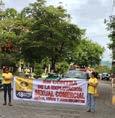
Along with its partners, the IBCR aims to prevent all forms of child exploitation, violence, abuse and neglect This includes sexual exploitation (particularly in the travel and tourism industry), child pornography, urban or armed conflict, child trafficking, early or forced marriage, and all other practices that threaten child survival or development The IBCR ensures that children are offered better protection and that those who face different forms of exploitation and violence are protected, listened to and respected
The Bureau works to protect and promote children’s rights during emergency situations caused by crises, armed conflict or natural disasters, particularly those related to climate change By strengthening the capacities of all humanitarian workers, the IBCR aims to effectively apply national, regional and international laws and standards related to sustainable knowledge and expertise

The IBCR defends an inclusive and systemic child protection system This approach is part of a system that involves various child protection stakeholders, including: children and youth, their families, communities, government, civil society and private organisations Several factors must be in place to achieve effective child protection, particularly the determination and ability of these players to be agents of change
The IBCR equips these players so that they can fulfill their roles in promoting and protecting the rights of children By building their skills, the IBCR also sustainably strengthens the child protection systems in their countries .
The IBCR provides technical assistance and promotes constructive, ongoing dialogue with competent authorities to ensure that local partners are able to effect the necessary changes to better protect children’s rights This support comes in the form of assistance with legislative reform, the adoption of standard operating procedures, and the development of internal policies, instructions and budgets .
Afghanistan
Algeria
Angola
Bangladesh
Benin
Burkina Faso
Burundi
Cameroon
Canada
Chad
Costa Rica
Côte d’Ivoire
Djibouti
Democratic Republic Of Congo
Dominican Republic
Egypt
Georgia
Ghana
Global projects
Guinea
Haiti
Honduras
Iraq
Jordan
Kenya
Liban
Libya
Madagascar
Mali
Morocco
Niger
Nigeria
Occupied
Palestinian Territories
Peru
Philippines
Republic of the Congo
Rwanda
Senegal
Togo
Tunisia
Uganda
Yemen
BENIN Cotonou hosted eight African delegations to the second regional brainstorming workshop, organised by the IBCR, the International Social Service, UNICEF and Terre des hommes The workshop aimed at identifying a shared framework of key skills development and reinforcements for social workers tasked with protecting children in Western and Central Africa
ANGOLA Two IBCR representatives travelled to Angola to continue gathering data on the child justice system, which were needed to carry out a comprehensive assessment of the system and to implement a UNICEF and European Union-backed reform project
AFGHANISTAN The training kit that was prepared as part of the Afghan police capacity building project was validated during a workshop held in Kabul
HONDURAS A mission led by the programme director for the Americas in Tegucigalpa helped define the basis of the agreement and establish the nature of partnership for PRONINEZ, a project aimed at strenghtening the child protection system
CANADA The IBCR facilitated a course offered to Global Affairs Canada agents, which was focused on children’s rights and child protection
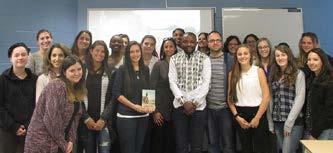
MOROCCO As part of the IBCR and Lawyers Without Borders Canada’s voluntary cooperation project for the protection of children, women, and vulnerable communities (PRODEF), the IBCR retained the services of a volunteer legal advisor to support Association Bayti in carrying out various legal tasks relating to human rights
DEMOCRATIC REPUBLIC OF THE CONGO A work group from the legal sector reviewed current laws, as well as governmental and non-governmental agents involved in child protection, during an IBCR-led workshop held in Kinshasa .
MADAGASCAR As part of UNICEF’s and the Government of Madagascar’s cooperative programme for the reinforcement of the child protection system, the partnership formed by the IBCR, UNICEF and Madagascar’s Ministry of Population, Social Protection and Promotion of Women began working on a study on violence committed against children
HONDURAS During their second mission to Honduras, two IBCR representatives visited three of the country’s provinces, met with the Directorate for Children, Adolescents, and Family (DINAF), and together defined the roles and responsibilities of each partner in the upcoming consortium The IBCR also rallied support and cooperation from the various key players of the child protection system in Honduras .
CANADA The director general, the programme director for the Americas, and the project manager for the PRODEF voluntary cooperation programme travelled to Quebec City to meet with their partner and discuss the project’s progress
TUNISIA A communications advisor for the voluntary cooperation programme was appointed by the IBCR to help Association Amal pour la famille et l’enfant (Amal Centre for Families and Children) prepare a communications strategy
June
CANADA The IBCR organised its first summer school at UQAM’s Faculty of Political Science and Law, to introduce students to the various aspects of children’s rights protection (legal, political, security, administrative) and the different issues field agents are faced with .
CANADA During the IBCR’s general assembly, the board of directors announced the departure of four of its members, including the chairperson, the arrival of a new director, and the election of new IBCR chairperson
HONDURAS The IBCR signed an agreement with UNICEF and received financial support from Global Affairs Canada to implement the bilateral project aimed at strenghtening the skills of the child protection system’s key players (PRONIÑEZ) over a six-year period Stemming from a partnership between UNICEF, the Directorate for Children, Adolescents, and Family (DINAF), Plan Honduras and the IBCR, the project will include assessments and analyses, capacity building workshops, the drafting of teaching aids, and the development of training programmes
CANADA As part of a brainstorming session on the organisation’s strategic plan for the next three years, the management committee held a meeting to discuss a preliminary operational matrix, which included the IBCR’s vision and approach
CANADA As part of a series of strategic consultations aimed at supporting the review of Canada’s aid policy, the Canadian government asked the IBCR to give a presentation in Toronto prior to the “Health and Rights of Women and Children” workshop The presentation focused on the wellbeing and empowerment of children and youth .
July
BURKINA FASO The IBCR facilitated a multi-sector workshop in Bobo-Dioulasso for approximately 30 police officers, gendarmes, legal personnel, and social workers The thematic workshop detailed the roles and responsibilities of each player regarding the protection of vulnerable children, victims, witnesses, and suspects . During the annual meeting, the project’s steering committee presented the status of annual reports and plans, and assessed the progress of the project’s implementation
DEMOCRATIC REPUBLIC OF THE CONGO During an exploratory mission of seven of the country’s provincial Child Protection and Prevention of Sexual Violence (PEPVS) squadrons, numerous data was collected to produce new specifications for these units The steering committee also held a meeting in Kinshasa
MOROCCO As part of the voluntary cooperation programme implemented by the IBCR and Lawyers Without Borders Canada consortium, two IBCR representatives visited Association Bayti’s farm school in Kenitra . Founded in 2006, this school offers youth at risk a two-year professional training programme in agriculture combined with psychosocial rehabilitation work
TOGO The IBCR facilitated an instructors’ training workshop on children’s rights and child protection in Togo aimed at social work training institutions, such as the National Academy for Social Education (ENFS) These institutions are now better equipped to train government and civil social workers, enabling them to efficiently carry out their mission of protecting children and promoting their rights .
TUNISIA Amal Centre for Families and Children, a voluntary cooperation programme partner in Tunisia, welcomed IBCR representatives and presented the association’s various structures to them The IBCR visited the temporary accommodation centre for single mothers and their children, as well as the educational support centre and the socio-professional integration centre Founded in 2014, these centres help reintegrate vulnerable women by reinforcing their employability and creating sustainable revenue sources
CANADA During the 2016 World Social Forum held in Montréal, the IBCR and Lawyers Without Borders Canada manned a booth on voluntary cooperation and the PRODEF project . Back from their missions in Guatemala, Haiti, Honduras and Morocco, volunteers were able to share their experience on the field with the many attendees Hundreds of visitors listened to the issues facing the countries targeted by the project
COSTA RICA Civil society groups, represented by Paniamor (a voluntary cooperation programme partner), and public institutions worked together for the adoption of Bill 19 337, the “Law against inappropriate unions,” by the Costa Rican legislative assembly As part of the process, the IBCR’s volunteer began her work several months before the voting date She helped the foundation draft supporting documents, statistics, and international standards in favour of these legislative amendments
ANGOLA The IBCR submitted its final report on the analysis of the country’s child justice system to its partner, UNICEF, and the Angolan government Specific recommendations were made to reinforce the system and to adjust current reforms in accordance with international standards
COSTA RICA The IBCR officially presented its mapping of the fight against human trafficking to the vice president of Costa Rica, the chief justice of the Supreme Court, and the Canadian ambassador This presentation was part of the capacity building project for institutions fighting against human trafficking, which was financed by the Government of Canada
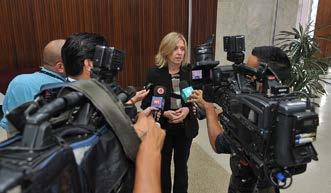
FRANCE In the September issue of TCD, the pedagogical magazine published by France’s Ministry of National Education reported on the experience of migrants In its section on international tourism, the magazine included the IBCR’s campaign poster for the fight against the sexual exploitation of children in the tourism industry, to show the other side of mass tourism .


HONDURAS To kick off the project in Honduras and recruit field teams, staff from the Montréal head office travelled to Tegucigalpa for work meetings with various partners of the PRONIÑEZ project
CÔTE D’IVOIRE The Association of Women Lawyers of Côte d’Ivoire (AFJCI) welcomed a second volunteer legal advisor since the implementation of the PRODEF voluntary cooperation programme
TUNISIA The IBCR appointed a volunteer organisational management consultant to help Amal Centre for Families and Children with technical matters relating to its operations
CANADA As part of its goal to achieve operational excellence through the building of its team’s capacities, the IBCR organised a specialised training session focused on children’s rights Through discussions and various exercises, including case studies and role playing, the team addressed various subjects such as the participation of children, international standards, and corporate social responsibility toward children’s rights
WORLDWIDE As part of the partnership between the IBCR, the Alliance for Child Protection in Humanitarian Action, Terre des hommes and UNICEF for the revision of Standard 14, regarding minimum standards for the protection of children in emergency situations, the IBCR produced a video on the issues linked to Standard 14 (justice for children in emergency situations) that was shown worldwide
CANADA The IBCR team took part in a three-day retreat to brainstorm about strategies and actions aimed at implementing quality programmes for the promotion and protection of children’s rights worldwide
TUNISIA As part of the voluntary cooperation project carried out with Amal Centre for Families and Children in Tunisia, the IBCR’s volunteer helped the association’s management committee develop human resources management tools Some of these tools included a first draft of an employee manual, an administrative and financial management guide, and several current and projected organisation charts
CANADA A “lunch and learn” was organised at the IBCR’s head office for the Montréal team, Lawyers Without Borders Canada and other participants A volunteer shared her experience as an organisational management consultant for Association Bayti in Morocco
CANADA As part of a consulting day organised by Québec’s International Relations and Francophonie minister (MRIF) aimed at informing the civil society about major international trends observed, the IBCR participated in a workshop to share its experience and vision These discussions informed brainstorming on the direction and objectives that should guide the Government of Québec in the provision of international aid over the next few years
CANADA The IBCR attaches significant importance to training its team and interns They took part in a presentation on best practices for the development of standard operating procedures
AFGHANISTAN/INDIA As part of the Afghan national police capacity building project, three IBCR colleagues facilitated a 12-day training session aimed at Afghan nationals who had travelled to Mumbai, India, for the event
CANADA The IBCR’s director general participated in a “lunch and learn” organised by the Montréal Council on Foreign Relations, with the Honourable Stéphane Dion, Canada’s Minister of Foreign Affairs The conference’s agenda included: the main direction of the Government of Canada’s foreign policy, Canada’s contribution to world peace and safety, and the importance of diversity and inclusion within the international community
MADAGASCAR A field mission took place in Madagascar as part of the study on violence committed against children The mission led to the organisation of various work sessions to implement a participatory approach, to assess activity start-up and to encourage ongoing coordination and collaboration efforts
CANADA One of the founding principles of Canada’s Youth Criminal Justice Act is that measures taken must respect gender, ethnic, cultural, and language differences, as well as meet the needs of Aboriginal youth and special needs youth The IBCR took part in a webinar to find out more about innovative programmes that encourage these objectives by providing services adapted to the cultures of Aboriginal and Afro-Canadian youth, as well as to recent young immigrants
GERMANY The IBCR facilitated a validation workshop at the North-Rhine Westphalia State Police Institute for Training and Education, located near Cologne, Germany The workshop was organised as part of its partnership with the Peacekeeping Operations Department, a partnership that has been ongoing for four years now Representatives from eight UN peacekeeping missions, as well as several international experts, took part in the validation workshop
GLOBAL The IBCR is part of a coalition consisting of more than 140 international organisations fighting for deprivation of liberty to be used as a last resort only, and that clear guidelines be developed for its use . Following the approval of resolution 69/157 during the UN’s general assembly, an independent expert was finally appointed to oversee the first worldwide study on the subject: Austrian professor, Manfred Nowak
CANADA A training session took place with teams from the IBCR head office on how to best use new knowledge acquired about juvenile justice when implementing projects . Participants were able to better understand how the juvenile justice system and legal procedures for youth in Canada and Québec work, especially with regard to sexual assault cases The training also enabled the teams to better understand the additional protective measures aimed at young sexual assault victims
CÔTE D’IVOIRE The IBCR travelled to Côte d’Ivoire for a 10-day retrospective assessment (expost assessment) of its capacity building project for Ivorian police officers and gendarmes The project, completed in 2013, focused on children’s rights and child protection
CANADA The IBCR attended the official deployment of the Grande semaine des tout-petits [Toddler Week] in Québec . During the event, the first annual Québec toddler assessment, produced by Observatoire des tout-petits, was presented and local and regional initiatives in support of young children were highlighted throughout the event’s duration The IBCR’s director general took part in several interviews with the media on this topic .
COSTA RICA Several training kit development workshops were organised and led by the IBCR during the month, in cooperation with thirty guests from the Costa Rican judicial field, which included professionals involved in the fight against human trafficking and judicial school specialists, as well as steering and reference team members The workshops enabled the gathering of data necessary for the development of a judicial school training kit
PERU A new volunteer was appointed in Peru to help the Capital Humano y Social Alternativo (CHS Alternativo) organisation accomplish various legal tasks relating to the issues of human trafficking and sexual and economic exploitation of children
BURKINA FASO As part of the capacity building project aimed at the stakeholders of the child protection system, the project manager organised an onsite workshop to validate the situation and a development workshop for social workers to draft operating procedures
DEMOCRATIC REPUBLIC OF THE CONGO The IBCR’s institutional standards manager travelled to Kinshasa to lead a workshop on the use of a skillsfocused approach to build the capacities of the police force regarding child protection More specifically, the workshop’s objectives were to promote healthy practices relating to children’s rights, to assess the needs of a child with respect to his/her situation, and to communicate and interact efficiently and appropriately with children and members of his/her family and community
CANADA During a job fair held at Montréal’s Stanislas College, the project manager for the PRODEF voluntary cooperation programme and a legal advisor volunteer, who had just returned from a mission in Côte d’Ivoire, met with teenagers preparing for university They spoke with them about the opportunities available in the field of international relations and cooperation .
CANADA The director general co-hosted a second training session this year in Ottawa, to enable Global Affairs Canada agents to explore the technical, thematic, and normative dimensions of children’s rights
HONDURAS A technical steering committee was established as part of the project to reinforce the child protection system . The committee’s goal is to ensure the participatory management of all project participants, and to foster communications between beneficiary institutions
COLOMBIA The director of programmes carried out a mission in Bogota to meet new potential partners for the PRODEF project Meetings took place for the capacity building of COALICO (Coalición contra la vinculación de niños, niñas y jóvenes al conflicto armado), a Colombian NGO dedicated to children’s rights The second part of the mission involved meeting with Colombian institutions (police, legal, and social protection), UN-based organisations and civil society to assess the possibility of implementing a new project in Colombia aimed at strenghtening the juvenile penal justice system following peace accords
ITALY The IBCR team travelled to the United Nations’ logistics base in Brindisi to lead a workshop aimed at guiding the development of a new child protection training kit for UN police officers The workshop was attended by around 30 trained instructors from around the world
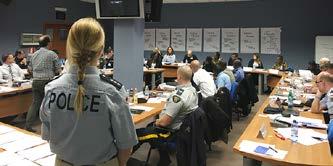
CANADA As part of the voluntary cooperation programme, the director of programmes and representatives from the programme’s partner organisations met with the Honourable Marie-Claude Bibeau to present the results to date and to discuss the project’s next steps
BURKINA FASO A workshop to validate the situation was organised and led by the IBCR’s project manager in Ouagadougou . Thanks to the workshop, the Bureau was able to present the status of child protection in Burkina Faso to the various participants and begin preparing and developing operating procedures for social workers
CANADA As part of the IBCR’s partnership with Universalia, a Montréal firm specialised in assessments, the IBCR programmes team took part in a professional training session on results-driven management Using practical exercises, the training aimed at enhancing results-driven management abilities for project follow-up and assessment Logic diagrams, performance measurement framework and risk management were also broached during the capacity building programme
CANADA As part of the International Forum organised by the Centre for International Studies and Cooperation and World University Services of Canada, the IBCR’s development and learning officer was invited by the Canadian Research Institute on Humanitarian Crisis and Aid to give a presentation entitled “De Homs à Berlin, l’itinéraire périlleux de ceux qui fuient la guerre” [From Homs to Berlin – The perilous journey of those fleeing war] She shared the story of a Syrian refugee family who fled the war to go first to Lebanon and then to Germany, and spoke of the effects of the conflict and of displacements on Syrian children
MOROCCO A volunteer advisor on organisational management and fundraising worked with Association Bayti for a few months, providing the team with advice, assistance and technical support in their fundraising and management efforts
CANADA Child participation is part of the IBCR’s guiding principles . With this in mind, the institutional standards manager led a series of meetings to lay the foundations for the IBCR’s future child participation guidelines
BENIN The IBCR began the second phase of its project in Benin, in collaboration with UNICEF and the country’s authorities IBCR had already developed standard operating procedures for child protection services, police stations and gendarme brigades, as well as a practical training kit on children’s rights for the Central Bureau for the Protection of Minors (OCPM) and police and gendarme forces Now, the IBCR can focus on supporting the OCPM during the deployment of these operating procedures and the development of the OCPM’s decentralisation strategy .
DEMOCRATIC REPUBLIC OF THE CONGO The programmes support manager in the Montréal head office met with the DRC’s administrative team to support field personnel in the drafting of project administrative and financial procedures and in the development of new IBCR management tools The Kinshasa team also welcomed representatives from Global Affairs Canada, who assessed the project’s progress
COSTA RICA The IBCR welcomed a Costa Rican judge who travelled to Canada as part of a discussion on best practices for the institutional reinforcement project aimed at fighting human trafficking The judge met with various specialists and organisations who deal with human trafficking victims During this same period, the IBCR’s communications manager travelled to San José to support the field team in the drafting of a communications strategy in line with the project’s advocacy objectives .
CANADA Several presentations on children and emergency situations were given at the IBCR head office More specifically, the presentations focused on children in armed conflict, the higher interest of refugee or displaced children, Security Council Resolution 1612 for grave violations against children in situations of armed conflict, and minimum protection standards for children in emergency situations
MADAGASCAR The study project on violence committed against children reached its third and penultimate phase Along with the IBCR project manager, two investigator teams led interviews, discussion groups and multi-sector workshops Various players involved in protecting children against violence also took part in these activities (youth, authorities, child services practitioners, community leaders, etc )
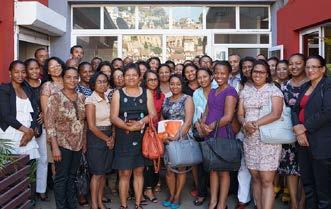
CANADA The executive committee of the board of directors got together to review and validate the IBCR’s programming and budgetary planning for the upcoming year The board of directors also welcomed a ninth member, a treasurer
BURKINA FASO The French production agency HAA carried out an exploratory mission in Ouagadougou to develop a proposal for audiovisual supports to be integrated into police, gendarme, social worker, and justice officials’ training kits . The IBCR’s communications manager, the programmes support manager and the institutional standards manager also travelled to Burkina Faso to help field personnel carry out their various mandates Finally, the IBCR’s director general and chairperson spent a few days in the capital, where they met with several ministries’ secretary generals involved in the child protection system reinforcement project
CÔTE D’IVOIRE A workshop on marital status was organised in Bouaké by the legal clinic of Bouaké and the Association of Women Lawyers of Côte d’Ivoire (AFJCI), both partners of the voluntary cooperation programme Several members of the IBCR and of Lawyers Without Borders were invited The workshop aimed at informing pregnant women and young mothers at Koko Maternity on how to register a birth
COSTA RICA The San José field team welcomed the programmes support manager for Latin America, who provided administrative and financial support for year-end activities
CANADA “Ma carrière en développement international” [“My career in International Development”], a fair organised by SUCO, was attended by over 250

youth interested in pursuing a career in international development The manager of the PRODEF voluntary cooperation programme, along with two IBCR interns, spoke about the project and hiring opportunities in Costa Rica, Morocco, Tunisia, and Côte d’Ivoire
HONDURAS A series of workshops were organised in the western and northern regions of Honduras, as well as in the capital, Tegucigalpa, with key players from the child protection system The workshops enabled police officers, judges, lawyers and other agents and stakeholders to share their experiences, concerns and recommendations about the child protection and justice systems
BANGLADESH The director of programmes travelled to Dhaka to lead a mission, in cooperation with UNICEF Bangladesh The objective was to gather information needed to draft a preliminary report and a proposal for future collaboration between both organisations . During the mission, the IBCR met with key child protection ministers, local and international NGOs, as well as a group of teens from a poor neighbourhood in the capital
CANADA As part of a “lunch and learn”, organised by the IBCR and the UQAM student committee of Lawyers Without Borders, two volunteers who had returned from a mission shared their experience with the many students that attended the event Participants discussed issues that can arise in intercultural situations and during the implementation of the PRODEF project
COSTA RICA A knowledge and expertise sharing trip was organised by the San José team, who welcomed a Colombian prosecutor for a few days . Several meetings took place with those involved in the Costa Rican justice system, with a special focus on issues relating to human trafficking
 Group discussion with children and youth, Burkina Faso
Group discussion with children and youth, Burkina Faso
BRIEF PROJECT HISTORY: In 2014, Global Affairs Canada issued a request for proposals for the renewal of the Voluntary Cooperation Programme and opened it to new Canadian organisations. Lawyers Without Borders Canada (LWBC) and the IBCR, working as a consortium, presented the Protecting Children, Women and Other Vulnerable Groups Programme as a five-year undertaking. In May 2015, the Government of Canada approved the programme and it was implemented that summer.
GOALS:
The programme aims to improve protection of the rights of children, women and poverty-stricken or marginalised people, while strengthening democracy and improving access to justice in different countries
Through this programme, Canadians with proven expertise in a specific field can work for partners in developing countries The idea is to bolster the partner organisation’s capacities and create lasting change IBCR volunteers work directly with local organisations in nine countries throughout the Americas and Africa, namely Bolivia, Colombia, Costa Rica, Côte d’Ivoire, Guatemala, Haiti, Honduras, Morocco, Peru and Tunisia Volunteers may stay abroad for anywhere from two weeks to several months as they share their knowledge and skills, as well as support work aimed at benefitting children The programme is an opportunity for Canadians to gain from one-of-a-kind experiences and subsequently help raise public awareness about the issues affecting international development and the rights of women, children and vulnerable communities
PARTNERS: Global Affairs Canada, ASFC Colombia (Colombia), Corporación Humanas (Colombia), Paniamor (Costa Rica), Association of Women Lawyers of Côte d’Ivoire (Côte d’Ivoire), ASFC Guatemala (Guatemala), Bufete Juridico de Derechos Humanos (Guatemala), Centro Para la Acción Legal en Derechos Humanos (Guatemala), Collectif contre l’impunité (Haiti), Haitian Public Protection Office (Haiti), Kay Fanm (Haiti), COFADEH (Honduras), Association Bayti (Morocco), Amal pour la famille et l’enfant (Tunisia), APRODEH (Peru), CIPRODEH (Honduras), CHS Alternativo (Peru), and IPRODES (Peru)
ACCOMPLISHMENTS:
This is what the IBCR and LWBC did over the past year: Sent 24 volunteers with expertise in law, organisational management or communications
Organised follow-up missions to five of the programme’s target countries: Colombia, Côte d’Ivoire, Guatemala, Morocco and Tunisia
Held events to discuss the experiences of volunteers returning from their missions . These aim to raise awareness about international development and volunteering among the Canadian public
Launched the PRODEF website, which describes the programme: http://www cooperationvolontaireasfcibcr com/
“The way I see it, being a volunteer means helping as much as you can so that you won’t have to help any more […] My goal is to assist legal professionals in their work, but also to ensure that this type of assistance will no longer be needed once I leave That’s what capacity building is all about and what PRODEF volunteers want to achieve
My volunteer experience at the Bouaké Legal Clinic essentially involved practicing law in its most basic form It’s all about being there on the ground day after day It’s about meeting with women and children, and doing your best to offer them legal aid I was lucky to be surrounded by dedicated and competent workers who taught me something new each day I helped them with specific files and projects, primarily those concerning children’s rights In short, volunteering is an enriching and gratifying experience, both professionally and personally ”
Malika SaherSupported the development of five legislative proposals on children’s rights, including:
Costa Rica: On crimes against minors and on protecting children from cyber-violence
Peru: On child labour, human trafficking and migrant smuggling
Provided advocacy assistance to Paniamor concerning a bill against the marriage of minors under the age of 18 in Costa Rica . The bill was approved by the Legislative Assembly in August 2016
Provided legal assistance to 71 victims of crime in vulnerable communities in Peru and Côte d’Ivoire
Organised 12 workshops to raise awareness of children’s rights, including:
Costa Rica: On protecting children from cyber-violence
Côte d’Ivoire: On gender equality and raising child awareness about cyber-crime and its consequences
Morocco: On the Convention on the Rights of the Child, the justice system for children, the Québec education system and justice for children

Peru: On the United Nations Committee on the Rights of the Child and the optional protocols of the Convention on the Rights of the Child
Held two children’s rights advocacy events in Costa Rica, with a specific focus on protecting children in a digital age and child sexual exploitation
Developed seven management tools to reinforce partner capacities to protect children’s rights, including:
Morocco: Terms of reference for job postings, organisational analysis reports, and a strategic intelligence tool
Tunisia: Employee handbook, new organisation chart, task description and employee contract templates
Produced communication tools to reinforce partner capabilities for raising awareness about children’s rights, including:
Côte d’Ivoire: Posters and brochures on children in conflict with the law
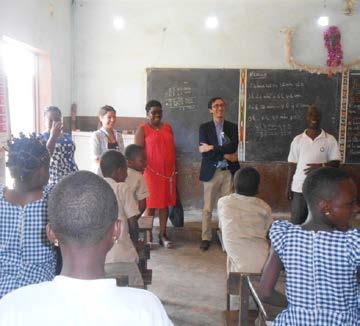
Morocco: Country profiles
Tunisia: Video and brochure
BRIEF PROJECT HISTORY: In 2009, a regional conference focused on adapting police practices to children’s rights, took place in Ouagadougou with the IBCR. Since then, national Burkinabé authorities have showed interest in adopting child-friendly practices, and they have reiterated this interest by participating in subsequent regional workshops. Based on discussions held, a national plan was developed to reinforce the training framework for front-line child protection agents. This action plan forms the basis for a project currently being implemented by the IBCR and Burkinabé authorities. The capacity building project for security forces, justice personnel and social workers involved in child protection is financed by Global Affairs Canada and is scheduled over five years (2015–2020).
GOALS:
The purpose of the IBCR’s intervention in Burkina Faso is to strengthen the capacities of police officers, gendarmes, social workers and legal personnel To do so, the IBCR will provide these professionals with the tools and skills needed to deal with issues surrounding child protection within the justice system, as well as to reinforce coordination mechanisms between various stakeholders and the child protection system
The IBCR strives to:
Ensure that the security, judicial and social environments surrounding girls and boys in Burkina Faso become more respectful of child protection and participation issues
Better equip and train security forces, justice personnel and social workers in Burkina Faso in protecting children, while taking into account their gender-based situation
238 children and youth aged 8 to 23 years old were met during discussion groups
270 individuals were consulted during the data collection phase
187 participants attended thematic workshops
43 people were met at the schools
More than 85 stakeholders were consulted during validation workshops and to draft operating standards for social workers
19 children and youth were invited to a brainstorming session on audiovisual supports to be developed and included in the training kits
PARTNERS: Global Affairs Canada; Ministry of Women, National Solidarity, and Family; Ministry of National Defence and Veterans Affairs, Ministry of Security; Ministry of Justice, Human Rights and Civic Promotion; National School of Administration and Magistrature (ENAM); National Institute of Social Work; School for Mid-Level Management in Social Work; School for Upper-Level Management in Social Work; National Police School; Police Academy; National Gendarmerie School; National School for Gendarmerie Sub-Officers; National Qualification Centre for Gendarmerie Sub-Officers; and other national and international organisations
ACCOMPLISHMENTS:
The first phase of the project focused on data gathering, discussions and strategic brainstorming It led to the development of a comprehensive and specific understanding of the practices, skills, and competencies of the child protection system’s players, as well as to the implementation of a solid consultation framework Now that this basic data has been acquired, especially with regard to capacity building and competencies, the team is actively working with national partners to produce the tools needed to meet project objectives . For the most part, these tools are training kits and operating procedures, for which player involvement is crucial so that they may appropriate these tools The IBCR must also ensure that the tools meet their needs and practices, and that they are incorporated into the formal consultation framework for improved sustainability
An assessment of the child protection system in Burkina Faso, examining the roles and responsibilities of police officers, gendarmes, social workers, and legal personnel, was carried out and will be published in the summer of 2017 The assessment provided a better understanding of their practices, knowledge and competencies with respect to children’s rights and adaptability to children
The assessment included the following activities:
Six thematic sector- and multi-sector-based workshops held in Ouagadougou and the provinces
Facilitation of 20 discussion groups with children and youth (girls and boys)
Approximately 50 bilateral and group interviews with key players of the child protection system
Visits to seven police, gendarme, social worker and legal personnel vocational schools
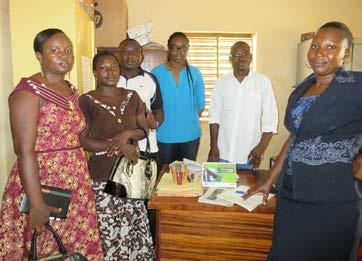
Validation workshop for the Koudougou assessment in December 2016
As part of the project’s implementation, the following activities were also carried out:
Drafting of the first standard operating procedures for social and legal work; an operating procedure development workshop focused on social workers’ assistance to children victims of violence took place in Ouagadougou in December 2016
Validation by the Ministry of Justice of the operating procedure’s subject matter, i e assisting children facing difficulties within the justice system
Development of the first training kits for social and legal work
About defense and security forces
“Police officers and gendarmes do a good job because they protect the population ”
“Some police officers and gendarmes don’t listen to children They don’t give them time to express themselves They listen to adults more than they listen to children ”
About social workers
“Social workers help us They give us advice And, when we’re sick, they help us get better ”
“It depends on the person Some of them are nice; they listen to your problem and try to help Others don’t care about you And some of them will say you’re too dirty Instead of listening to you, they’ll dishearten you ”
About legal personnel
“An encounter with a judge goes well only if he or she considers real facts As children, we are most often understood by and given advice from the judge ”
“Talking with a judge is like talking to your mother or your father ”
Twelve IBCR missions in Burkina Faso to complete the various project activities and to provide support to the field team during the setting up of a satellite office in Ouagadougou and for partner mobilisation
Two follow-up and planning missions carried out by the project coordinator in Canada
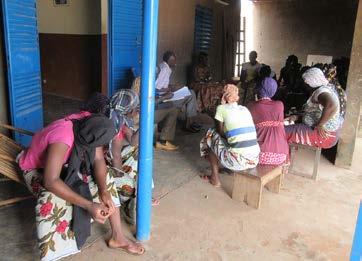
Development of a gender equality strategy for the project
Brainstorming on a project advocacy and communication strategy
Signing of a partnership agreement with the National School of Administration and Magistrature (ENAM) for the development of an initial training kit for legal personnel

BRIEF PROJECT HISTORY: Following a preliminary discussion with the Government of Angola at an African regional workshop on child-friendly police practices organised by the IBCR in 2013, discussions were held with UNICEF Angola on a possible action strategy. During this period, UNICEF received significant support from the European Union to support justice reform in Angola. Two years later, the IBCR was selected to carry out an in-depth analysis of Angola’s juvenile justice system and to lay the groundwork for a European Union-backed reform project.
GOALS:
Evaluate Angola’s justice system for children and related services, taking into account factors such as effectiveness, efficiency, impact, viability and relevance
Prepare recommendations on how to strengthen the system for the Government of Angola and UNICEF
PARTNERS: UNICEF Angola, Department of Justice and Human Rights, Department of the Interior, Department of Social Security and Reintegration
ACCOMPLISHMENTS:
The IBCR carried out two missions during which 25 structures were assessed Through this process, the IBCR identified the main strengths and weaknesses of the justice system for children and its institutions, as well as the interactions between the actors involved in the formal and informal systems The IBCR was also able to extract lessons learned and best practices, while pinpointing the system’s primary challenges The IBCR’s recommendations included:
Strengthened the legal framework
Improve coordination between the various institutions assisting children who come into contact with the legal system
Build the capacities of the system’s key players
Ensure better resource allocation
Manage information more effectively
BRIEF PROJECT HISTORY: In 2005, the United Nations Commission on Crime Prevention and Criminal Justice adopted the IBCR’s Guidelines on Justice in Matters involving Child Victims and Witnesses of Crime in Vienna, Austria. When it became apparent that no studies had been carried out on the application of these guidelines in Québec, the IBCR decided to conduct a 2010 study on Québec laws to determine whether they complied with the guidelines. The study’s findings emphasised the importance of documenting the experiences and opinions of child victims and witnesses of crime in the Québec justice system. This recommendation was implemented and led to the research being conducted today, which aims to collect the stories of youth experiences with the criminal justice system in Québec and ensure their feedback is incorporated as part of their right to participate in the process. The project is being financed by the Québec Ministry of Justice’s Aid Office for Victims of Criminal Acts. It began in 2012 and is scheduled to end in 2017.
GOALS:
Provide data on the strengths and weaknesses of the criminal justice system from the perspective of youths who have experienced it as victims or witnesses
Offer study participants the chance to actively promote and ensure respect for their rights
PARTNERS: A network of criminal and penal prosecuting attorneys from the judicial districts of Montréal, Gatineau and Québec City, as well as various agents of crime victim assistance centres in Montréal
ACCOMPLISHMENTS:
“Listen to children and ensure their participation. Children and adolescents are resourceful citizens capable of helping to build a better future for all We must respect their right to express themselves and to participate in all matters affecting them, in accordance with their age and maturity ”
United Nations General Assembly Declaration A World Fit for Children (May 6, 2002), A/RES/S-27/2, Par 7
Produced a final research report (under publication) documenting the experiences and opinions of child victims or witnesses of crime in the Québec justice system The report also describes the factors that encouraged or discouraged youths from reporting crimes to authorities It outlines children’s use of Québec assistance programmes for witnesses of crime, their likelihood to follow-up on their files and their experiences throughout the entire legal process Special attention was paid to children’s opinions on how their feedback was collected and applied to the legal process, as well as their sense of fairness or unfairness during this procedure
Drafted recommendations in light of children’s feedback to reinforce their participation in the legal process, particularly with regard to access to information, assistance and safety
Present the study to the youths who participated in it and to prospective partners in 2017
THE THREE MAIN GOALS OF THE STUDY:
Offer young victims and witnesses of crime the opportunity to express their opinions on the justice system
Gain a better understanding of what encourages or discourages youth participation in the criminal justice process
Prepare recommendations based on feedback from youth
BRIEF PROJECT HISTORY: Human trafficking is considered a form of modern slavery and is one of the worst violations of human rights. Around the world, thousands of people are trafficked, including a large number of children. Thanks to financial support from Global Affairs Canada, the IBCR set up a project in Costa Rica to support the country’s fight against human trafficking, especially where it concerns child sexual exploitation. The project began in September 2015 and is scheduled to take place over a three-year period.
Through this project, the IBCR aims to support the professionalisation and reinforce the capacities of key actors involved in monitoring, preventing, investigating and prosecuting human trafficking crimes in Costa Rica . The project involves 21 public agencies, all of which are members of the National Coalition Against Human Trafficking and Migrant Smuggling (CONATT), as well as law enforcement and legal practitioner training units
The IBCR has planned the following activities: Review standard operating procedures used by CONATT, each of its members and the Office of the Deputy Prosecutor Against Human Trafficking and Migrant Smuggling (FACTRA)
Develop specific training kits on different human trafficking issues for the legal and law enforcement sectors, as well as the Coalition
Encourage partner institutions to adopt and apply updated operating methods and training courses Hold regional discussions on strategies to share information and best practices
Develop strategies to promote stronger ties and cooperation between police forces and members of communities affected by human trafficking The goal is to create local alliances so that cases can be more readily identified and reported
PARTNERS: Global Affairs Canada, Embassy of Canada to Costa Rica, National Police School (ENP), Judicial Academy (EJ), training units of the Judicial Investigation Organisation (OIJ) and of the Attorney General’s Office (MP), Technical Secretariat and 21 members of the National Coalition Against Human Trafficking and Migrant Smuggling (CONATT), Office of the Deputy Prosecutor Against Human Trafficking and Migrant Smuggling (FACTRA) and National Commission Against Commercial Sexual Exploitation (CONACOES)
“On behalf of the Public Prosecutor’s Office of Costa Rica, I would like to thank the IBCR for their invaluable support, particularly the assistance they provided to the Deputy Prosecutor’s Office on issues concerning human trafficking and migrant smuggling
Without a doubt, migrant smuggling and human trafficking are crimes that violate human rights, and they are one of the major problems faced by all countries worldwide Costa Rica is no exception . This is why it was so important for us to receive assistance from the IBCR, as we sought to strengthen the public prosecutor’s ability to fight these criminal acts I would also like to thank the IBCR for making it possible for our office to collaborate with our counterparts in Colombia This was a truly enriching experience that allowed us to establish direct lines of communication with them This will not only be useful for sharing information, but also for running joint investigations ”
Javier Valerio Vásquez Deputy Prosecutor“As soon as I was invited to participate in an IBCR-led workshop, I expressed my interest in looking into how we might standardise the process for analysing human trafficking crimes, for approaching victims and for handling related investigations We then held a series of meetings to plan a training procedure for all prosecutors and administrative personnel The IBCR facilitated the process for us by providing a space for discussion and preparing the tools we needed They offered essential support as we developed the course and their involvement helped generate interest from our team ”
Sergio Valdelomar Fallas Deputy ProsecutorDeveloped a series of strategies to promote collaboration between informal workers in the tourism industry and the project’s partner agencies to prevent and report human trafficking
Developed a mapping report on human trafficking in Costa Rica and held a press conference at Costa Rica’s Supreme Court with participation from Ana Helena Chacón, the Second Vice-President of Costa Rica, Zarella Villanueva, the President of the Supreme Court, Michael Gort, Canada’s Ambassador to Costa Rica and other key players in the fight against human trafficking
Developed and validated a training checklist to be used as a roadmap for preparing justice training kits developed for the Judicial Investigation Organisation and the Attorney General’s Office

Developed and validated standard operating procedures for CONATT, including 16 summary diagrams of procedures
Exchanged information and shared best practices used by a Costa Rican judge and a Costa Rican prosecutor in Canada and Colombia
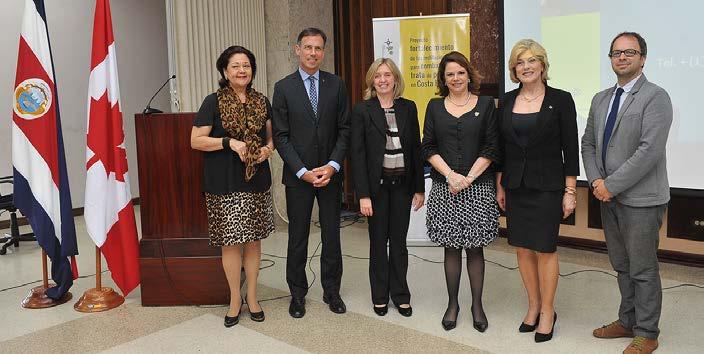
144 participants helped develop strategies for encouraging collaboration between the private sector (informal workers in the tourism industry) and the public agencies involved in the project
142 women were involved in preparing and conducting the status assessment
216 people participated in the various activities held from October 1, 2016 to March 31, 2017

BRIEF PROJECT HISTORY: The study on violence against children in Madagascar is part of the 2015–2019 Country Programme signed by the Government of Madagascar and UNICEF. The purpose of this programme is to strengthen the child protection system by adopting a political and legal framework, improving the justice for children system and reducing the incidence of violence by creating prevention and protection mechanisms. As part of this programme, the IBCR will carry out a study on violence against children in Madagascar, in partnership with UNICEF and Madagascar’s Ministry for Public Affairs, Social Protection and Advancement of Women. This study will be part of the national inquiry into the Millennium Development Goals.
GOALS:
Provide estimates on the incidence and nature of violent acts committed against children
Assess the causes of violence against children and its impact on victims, their families and the community
Identify potential risk factors that have a direct influence on the nature and scope of violence against children
Assess the knowledge and use of district – or national – level child protection services (social, legal and medical)
Issue recommendations on how to improve the national child protection policy, child protection programmes and legal reforms, and how to reinforce measures to prevent, identify and respond to violence against children more efficiently
74 participants attended the multi-sector workshops, including representatives from government ministries, civil society, fokontany (local villages) and districts
6 regions and 12 sites were covered as part of the study
The quantitative assessment included consultations with:
– 582 households
– 545 youth
– 437 school staff members
– 341 service provider staff members (e.g., healthcare)
PARTNERS: UNICEF; Ministry for Population Affairs, Social Protection and Advancement of Women; Study Technical Committee, whose members make up the “Violence Against Children Sub-Committee” (VAC) represented by: PRIMATURE; Ministry for Public Affairs, Social Protection and Advancement of Women; Ministry of Finance and the Budget (Social Affairs Office); Ministry of Agriculture and Livestock; Ministry of National Education; Ministry of Justice; Ministry of Public Health; Ministry of Public Safety; police overseeing morality and the protection of minors; National Gendarmerie; Judicial Police Office; Ministry of Public Health; Ministry of Mining and Oil; Ministry of Ministry of Tourism; Standardisation and Control Office; Ministry of Institutional Reform; Ministry of Labour, Technical Education and Professional Training; Ministry of the Interior and Decentralisation; Ministry of the Economy and Planning; Ministry of Higher Education and Scientific Research; Ministry of Youth and Sport; National Statistics Institute; SOS Children’s Villages; ECPAT; other technical and financial partners: BIT, UNFPA
Performed a literature review and drafted a note on methodology
Held two multi-sector brainstorming workshops in Antananarivo
Provided training to field investigators and piloted activities on how to assess the relevance of the research tools
Collected data from six regions within the country (Toamasina, Mahajanga, Toliara, Fianarantsoa, Antsiranana, Antananarivo)
BRIEF PROJECT HISTORY: For several years, UNICEF has been working with the Government of Bangladesh to map the child protection system. Through this joint effort, they hope to introduce a national policy on adolescents, particularly since the majority of the country’s population is under the age of 20. This prompted UNICEF to call on the IBCR to carry out an initial mission to Dhaka, the capital city, to meet with stakeholders and help the UN agency develop a work plan to facilitate the completion of these major initiatives.
GOALS:
Produce a summary evaluation of child protection needs
Recommend a work plan to UNICEF for mapping the country’s protection system
Recommend a work plan to UNICEF for developing a national strategy on adolescents
Lay the groundwork for a multi-year plan for strengthening Bangladesh’s child protection system over the long term
PARTNERS: UNICEF Bangladesh
ACCOMPLISHMENTS:
The IBCR went to Dhaka in February and March 2017 on an exploratory mission with UNICEF Bangladesh
During this mission, the IBCR met with partners from civil society partners and the main institutions that provide child protection services The Bureau also met with a group of adolescents in a youth club located in one of Dhaka’s marginalised neighbourhoods
The IBCR submitted a summary report to UNICEF with concrete recommendations and a methodology (including roadmap) for mapping the child protection system and developing a national strategy on adolescents
BRIEF PROJECT HISTORY: In December 214, UNICEF and the IBCR forged a partnership to support the Government of Benin’s initiative to expand the OCPM’s services beyond greater Cotonou to all children in the country, a decision that was aligned with past initiatives including the National Child Protection Policy. In particular, the plan to strengthen and expand the OCPM’s services to other departments within the country involved developing and validating standard operating procedures, preparing a service expansion strategy and an action plan, including technical, financial and material details for expansion into two new regions. The project also involved developing a practical training kit on children’s rights for use by the OCPM and its decentralised police and gendarmerie partners. During the first phase of the project, several missions and activities were carried out, and various strategic documents were produced for the OCPM, including: specifications, standard operating procedures, and a training kit (first draft). The IBCR is currently moving forward with the second phase of the project.
GOALS:
Phase 2 of the project is divided into two sections with the following objectives:
Professionals working in security fields
Ensure that the same training kit is used nation-wide and the strategy for expanding OCPM services is welcomed by other departments across the country

Prepare 20 judicial police officers to provide training on child-friendly intervention techniques
Create 30 focal points among the judicial police offers and offer them training on child-friendly intervention techniques
Because of the gaps in training available for professionals working in social fields, a decision was made to develop standardised training for use in the country’s Social Promotion Centres The project objectives include:
Introduce a training module on child-friendly mechanisms and procedures for use by the Government of Benin and social actors who work with children in difficult situations

Provide training to 30 instructors on the various modules to better prepare them for holding capacity-building sessions for field workers
PARTNERS: OCPM, UNICEF, National Police and Constable General Directorate, Department of Families, Social Affairs, National Solidarity, the Disabled and the Elderly, Department of the Interior, Public Security and Religious Affairs, Department of Justice, Legislation and Human Rights, and Key Civil Society Players Involved in the Child Protection System
ACCOMPLISHMENTS:
The IBCR conducted a two-week mission in March 2017 . Through this mission and workshops, the following was accomplished:
Presented the OCPM expansion strategy and action plan, which led to their adoption
Validated the training kit on child rights for OCPM personnel and focal groups
Held strategic meetings with key actors
Identified training needs for social actors
A new mission took place May 2017 to gather additional information and create the outlines for the training kits
Another mission will be held in the summer to hold train-the-trainer sessions for 20 specially selected judicial police officers These officers will then be asked to train 30 focal points, with assistance from the IBCR, on childfriendly intervention techniques and services

BRIEF PROJECT HISTORY: When armed conflicts occur, children are particularly vulnerable and are often the subject of grave violations, including forced recruitment for use in armed conflict, sexual or gender-based violence, murder, mutilation, separation from families, trafficking and unlawful detention. The United Nations Security Council’s resolutions have called for peacekeepers to be deployed to protect civilians against the effects of such conflicts. Recognising how important it is for all peacekeepers (military, civilian and police) to receive training, the Department of Peacekeeping Operations (DPKO) and the Department of Field Support (DFS), working jointly with several child protection actors, began developing child protection training courses for peacekeepers in 2012. Specialised tools for military personnel were launched in 2014 thanks to support from Germany. The DPKO then developed specialised tools for United Nations Police; these tools were intended for pre-deployment training to ensure that all agents had the knowledge and skills needed to adequately protection children. Since 2011, the IBCR has been working closely with the Child Protection Section of the DPKO to strengthen child protection training for various categories of field personnel deployed in peacekeeping operations. An in-depth study of the various tools and approaches used in the child protection training courses was carried out, and nine complete training modules were prepared.

Finalise the nine training modules on child protection, including the trainer’s manuals, support documents, PowerPoint presentations, an evaluation kit and case studies with role-playing games
Test the recommended tools during a pilot course with United Nations Police trainers
PARTNERS: The DPKO and its various divisions, eight United Nations peacekeeping missions, the Office of the Special Representative of the Secretary-General for Children and Armed Conflict, the Office of the Special Representative of the Secretary-General on Violence Against Children, UNICEF, the United Nations Development Programme, and the United Nations Office on Drugs and Crime
ACCOMPLISHMENTS:
Finalised the specialised training tools on child protection . These tools are modular so that trainers can select whichever sections are most relevant to the given situation
Validated these tools at a workshop with child protection specialists, United Nations Police on peacekeeping operations, and police instructors from integrated training centres . This initiative aimed to ensure that the documents were both relevant and practical
Led a pilot training course, jointly with the DPKO, for police instructors from more than 25 United Nations member states . This allowed the IBCR to test the training tools and adjust their content in accordance with our observations and the feedback we received
The DPKO distributed training material to the member states
In 2012, a major initiative was launched to consult with the United Nations Department of Peacekeeping Operations, child protection experts, United Nations member states and United Nations Police More than 500 civilians, military personnel and United Nations Police (UNPOL) members were surveyed, particularly on the relevance of specific child-protection training The survey results indicated that people and agencies are asking for child-protection training, but that there is also a need for other types of initiatives
It became clear that United Nations Police are looking for specialised child protection training that is different, in terms of content and methodology, than what is offered to military and civilians The table below shows the training gaps identified by UNPOL It also shows the topics that police agents would like to learn more about through specialised courses
70% of United Nations Police agents said that child-protection training is essential for their work and that they require more training on the topic Only half of respondents have received child-protection training
Respondents said they need training on justice for minors, the criminal justice systems in the countries they are deployed to, and techniques for communicating, interacting and conducting interviews with children
Identifying and responding to serious crimes and violence against children including harmful traditional practices, sexual exploitation and abuse, sexual or gender-based violence, child trafficking and child labour
BRIEF PROJECT HISTORY: One of the key objectives of the Child Protection Working Group (CPWG, now known as the Alliance for Child Protection in Humanitarian Action) is to evaluate, equitable and in an age-appropriate manner, interventions involving girls and boys who come into contact with the legal system. The Child Protection Minimum Standards in Humanitarian Action (CPMS) include a standard on Justice for Children, with a focus on justice for children undermined by severe emergencies such as armed conflicts or large-scale natural disasters. While child protection actors do partially address the problem in their wider response to child protection in emergencies, there is nonetheless a need to support the implementation of the CPMS. That is why, in 2014, the IBCR was called in to conduct, in partnership with Terre des Hommes, an in-depth analysis of the problems faced by children who interact with the justice system during humanitarian crises.
During the first project phase in 2014, an initial status assessment was carried out to determine the extent to which this international standard was applied during crises affecting children . This was followed by four 2015 case studies on four different countries These case studies were used to illustrate and complete the analyses appearing in the status report
The IBCR took part in to important meetings at the Alliance The annual meeting was organised in Bangkok in 2015, where the IBCR’s work was presented, and then a workshop was held in Beirut in 2016 to adapt Standard 14 to the situation in Lebanon
This year, a short video on justice for children was launched and posted on various online platforms with assistance from the IBCR Developed for a broader audience, this educational video explains the various challenges associated with Standard 14: Justice for Children, particularly in emergency situations . A working group was created, under the IBCR’s leadership and with participation from UNICEF and Terre des hommes, to follow up on Standard 14 .

Under the leadership of Terre des hommes, a quick-assessment model was developed to evaluate the status of child justice in emergency situations The IBCR intends to pilot test this model during development missions in Lebanon and Jordan in summer 2017
PARTNERS: The Alliance for Child Protection in Humanitarian Action, UNICEF, Terre des hommes
BRIEF PROJECT HISTORY: UNICEF Afghanistan and the IBCR signed an agreement in 2015 to offer capacitybuilding for Afghan police, as part of a larger UN strategy to help Afghanistan’s Ministry of Internal Affairs reform its police professionalisation programme. During the first phase of the project, the IBCR assessed the situation of children in relation to the application of laws and the judicial system in Afghanistan. This involved data collection, interviews with stakeholders and observation missions. The study led to a mapping report on the capacity-building initiative and the role of Afghan police services in child protection. 2016 marked the start of the second phase of the project, which involved developing standard operating procedures, reviewing the country’s specialised police service specifications, preparing training toolkits and holding the train-the-trainer sessions for national instructors who teach mandatory courses on child rights and protection in police schools.
GOALS:
Build technical capacity within the juvenile police and family response units, and for the Ministry of Internal Affairs’ childprotection officers
Ensure that courses on child-friendly practices are permanently added to basic and specialised police training
Align the skills of key personnel with the United Nations’ guidelines for professional community policing
PARTNERS: UNICEF and the Department of Internal Affairs of the Islamic Republic of Afghanistan (including the Afghan National Police)
ACCOMPLISHMENTS:
Officially launched a mapping report on the role of the police in child protection
Validated IBCR-developed training material with various police forces

Held a workshop to develop standard operating procedures for the various actors in Afghanistan’s child protection system
Provided a 12-day train-the-trainer course in Bombay, India, for Afghani instructors Through this training, participants became certified to teach mandatory courses on children’s rights and child protection as part of Afghanistan’s national police training programme
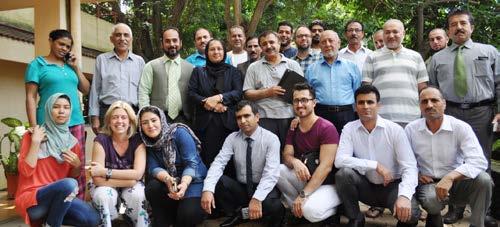
BRIEF PROJECT HISTORY AND GOALS: Since its inception, the IBCR has been dedicated to promoting and protecting children’s rights. The IBCR demonstrates this commitment by participating in activities leading to change and concrete action to advance children’s rights and align them with essential human rights in Canada and internationally. With this objective in mind, the IBCR strives to raise awareness of children’s realities, particularly in emergency situations. This work is the cornerstone for broader strategies and reaffirms the organisation’s active role in protecting children’s rights in emergency situations.
This fall, the IBCR’s general director participated in a “lunch and learn” organised by the Montreal Council on Foreign Relations and featuring the Honourable Stéphane Dion, Canada’s Minister of Foreign Affairs During this event, the minister presented Canada’s strategy for re-establishing itself as a major player on the international scene by stepping up its security and peacekeeping operations While the status of children in emergency situations was not explicitly mentioned, the information shared by the Canadian government over the past year indicates that it recognises and values the role of children in peacekeeping and reconstruction initiatives . The IBCR intends to remain active by ensuring that the status of children in emergency situations remains a priority as Canada renews its commitments to the international community

During the same period, the IBCR’s manager for institutional standards attended a conference at the University of Ottawa entitled “Rule of Law in Para-Governmental Interventions in Fragile States ” The conference featured experts and speakers representing the Department of National Defence, law instructors from the University of Ottawa, and law students Their exceptional presentations allowed the IBCR and all persons in attendance to deepen their understanding on various humanitarian and development issues, especially during military interventions The discussions also touched on the challenges related to adapting the rule of law to new conflicts occurring around the world and affecting children in particular
In March 2017, the IBCR’s programme director participated in discussion sessions with Médecins du Monde concerning access to healthcare for Canadian-born children whose parents are in the country illegally The IBCR will be supporting an initiative to protect the rights of these children within the Québec healthcare system by promoting international laws concerning children and health .
 Working group with police departments, Honduras
Working group with police departments, Honduras
BRIEF PROJECT HISTORY: In recent years, the Democratic Republic of the Congo has undertaken a major reform process to provide its population with better access to social and legal services. Backed by support from Global Affairs Canada, the IBCR helped the Congolese government draft its development strategy and in 2015, the “Batela Mwana” (“Protecting Children” in lingala) project was launched. This five-year project aims to strengthen the children’s rights and child protection capacities of professionals working in policing, legal services and social action.
GOALS:
The IBCR aims to strengthen the child protection system in the Democratic Republic of the Congo by permanently adding child protection modules to basic training (for new recruits) and to specialised training programmes (for personnel specifically mandated to work with children, such as juvenile court judges and child protection police brigades) at schools for police officers, justice personnel and social workers The idea is to provide them with essential tools and skills for better child protection, and to: Facilitate children’s access to social, safety and justice services that uphold their rights and allow children to participate in decisions that affect them
Provide police officers, justice personnel and social workers with customised tools and advanced skills to better protect children
Improve the quality of interactions between children and stakeholders by implementing standard operating procedures and new procedures tailored to children
Improve training structures for police officers, justice personnel and social workers so they can more effectively share knowledge and skills related to the rights and protection of children
PARTNERS: Global Affairs Canada, Ministry of Social Affairs, Humanitarian Action and National Solidarity, Ministry of Justice and Human Rights, Ministry of the Interior and Security, Congolese National Police, Police Reform Steering Committee, Superior Council of the Magistrature, Police Academy and Police Training Centres, National Institute of Social Work, National Institute for Legal Training
After 18 months, positive changes are already noticeable, particularly due to the project’s participatory approach and the fact that the beneficiary institutions are starting to see child protection as a separate issue requiring stakeholders to have a range of practical skills
“From Canada’s perspective, Congolese children, like children in all countries, should be given the chance to grow up in a calm, safe environment They should be given protection if they are victims of violence or if they come into contact with the justice system, police stations or social agencies
We are hopeful that the project led by the IBCR will make it possible for professionals—such as the magistrates, police officers and social workers who are tasked with protecting children within the justice system, police stations and social agencies—to develop new child protection skills and practices, as this is an important step to ensuring that the rights of Congolese children and youth will be upheld
I would like to thank everyone who helped make this project possible, particularly the secretaries, managers, legal authorities and police Your commitment to this project and to the cause of children in general is very much appreciated I know that we all have busy schedules, and that is why I am particularly grateful for your dedication to this cause, which is so important for the country’s future ”
Police: The general commissioner of the Congolese National Police has formally and publically committed to, through this project, improving policing skills, implementing standard operating procedures and strengthening the child protection units Seeing through on this commitment involves working closely with the IBCR to develop an operational guide for the Child Protection and Prevention of Sexual Violence (PEPVS) squadrons In addition, the project has prompted other key police actors in Kinshasa and the provinces, to put words into action and instill a movement from the ground up to improve practical skills in child protection
100 judicial police officers in provincial PEPVS squadrons were consulted
2 data collection missions were organised
10 field missions were carried out by the Montréal team to the DRC
Legal system: The IBCR supported the Ministry of Justice by actively contributing to the definition of a justice reform plan, which supports the organisation’s child protection mandate This highly strategic result should offer long-term guidance for child-protection capacity building initiatives, particularly by training magistrates at the upcoming National Judicial Education Institute (INAFORJ), by rehabilitating public childcare and education establishments, and by creating juvenile tribunals across the country .
Social sector: The project enabled the Ministry of Social Affairs to assert its leadership in the child protection sector by setting up a steering committee and organising meetings supported by the project While a recent political crisis in the country has mitigated these results, the preparatory work has been completed so that the next Ministry of Social Affairs can also become involved in implementing the project
The IBCR accomplished many things this year in the Democratic Republic of the Congo For example, the Bureau: Created a multi-sector working group and organised periodic meetings
Had the steering committee adopt, in July 2016, the project implementation plans and a 2016-2017 work plan
Conducted data collection missions in seven provinces: Goma, Bukavu, Matadi, Mbanza-Ngungu, Mbuji-Mayi, Lubumbashi and Kinshasa
Finalised and published a mapping report on the child protection system and the training available for police offers, legal professionals and social workers
Organised a workshop in Kinshasa on basic child protection skills for police officers

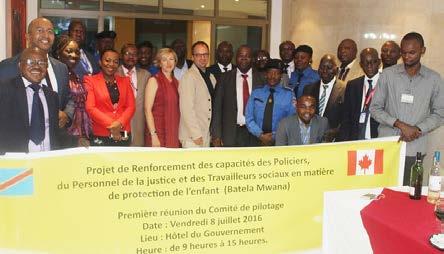
Developed an operational guide for the Child Protection and Prevention of Sexual Violence (PEPVS) squadrons
– Subsequently missions were organised in Goma and Bukavu to explain these guides in plain language
Produced a training kit for police offers; it is currently being reviewed by local partners
Mapped the various centralised data management tools
BRIEF PROJECT HISTORY: In recent years, Honduras has made major progress in strengthening its regulatory framework and policies on children’s rights. The enactment of the Basic Law on Education in 2012 and the reform of the juvenile justice system in 2013 attest to the legislature’s will to align its regulatory framework with international standards. Yet, there are still numerous challenges to creating a comprehensive child protection system, with insufficient financial resources and training for system actors being the most significant roadblocks. Reforms to the justice for children system and national police, as well as the creation of the Directorate for Children, Adolescents, and Family (DINAF), have helped prepare the country for restructuring and for establishing solid and sustainable protection measures. The PRONIÑEZ project was created to strengthen and improve institutions, and to develop the skills of individuals working within the child protection system. The project concept was developed and approved by DINAF, Plan Honduras, UNICEF and the IBCR, while funding came from Global Affairs Canada. It involves conducting evaluations and analyses, holding capacity-building workshops, preparing educational materials, and developing training programmes. Ultimately, the goal is to improve and standardise practices so that children’s rights can be upheld in their entirety. The project launched in 2016 and is scheduled for completion in 2022.
GOALS:
Reinforce DINAF’s capacities to prepare the organisation to effectively coordinate the national child protection system

Improve the justice for children system’s management of criminal files by implementing an approach based on children’s rights
Increase the state’s ability to prepare budgets focused on children, taking into account gender equality issues and specifically investing in programmes for girls
Improve and develop the technical skills of law enforcement agents and legal staff by applying international and regional standards on children’s rights
Promote improved cooperation between national and international agencies involved in child protection
PARTNERS: Global Affairs Canada, UNICEF Honduras, Directorate for Children, Adolescents, and Family (DINAF), Plan Honduras, Ministry of the Interior, National Judicial School, the Supreme Court of Honduras, and Honduran security forces
Established a field office in Tegucigalpa
Appointed and formalised a consortium management committee tasked with overseeing project activities and ensuring their complementarity
Created a technical steering committee to ensure that all project stakeholders are kept involved and to promote communication between beneficiary institutions
Appointed the IBCR to the child justice consultation committee so that it may act as an advisor and support the creation of the Honduran Institute for Children in Conflict with the Law (INAMI)
Held approximately 40 interviews with actors in the Honduran justice system (local government employees, civil society organisations, prosecutors and judges) to determine training and capacity-building needs, and to better understand the child rights situation in the country
“I truly believe that the PRONIÑEZ can be relevant Each member of the consortium has field experience and there is an opportunity for us to share lessons learned […] By working together, the partners have the potential to make a bigger impact, and this is a challenge that is worthy of our attention ”
Caridad Cardona, Manager of Walabis, Honduras
(Walabis is an arts organisation for children and teens It has received support from PRONIÑEZ to hold consultations with youths )
“Where the legal system is concerned, the project will benefit all legal staff, particularly juvenile court judges, and enable them to better serve the children and adolescents who come into contact with the legal system Even at a very early age, these children are vulnerable to abuse, violations of their rights, recruitment into street gangs and other factors that can have a negative impact on their lives […] At both the institutional and personal levels, we pledge our full cooperation to you, for the success of the project and of our country ”
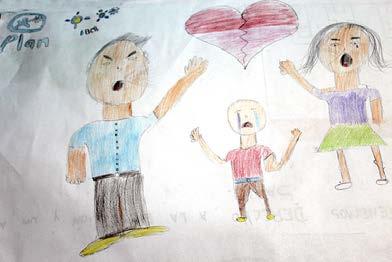
Floricel Sarahi Valladares Sierra Instructor at the Judicial School Guillermo Federico Williams Cruz Cooperating Agency Coordinator at the Judicial School
“Developing and implementing a project like PRONIÑEZ is an ambitious undertaking—but I’m confident it will be successful in strengthening our child protection systems at the national, local and community levels I am especially optimistic about potential improvements in the collaboration between stakeholders and the reinforcement of the normative and institutional frameworks, as we strive to create an environment that offers better protection to boys and girls in Honduras ”
Léa Beaudry Second Secretary (Development), Embassy of Canada in Honduras
Created 10 focal groups and held workshops to discuss the challenges and cooperation within the system Conducted field visits in Santa Rosa de Copán, Omoa and San Pedro Sula, as well as in the national capital, Tegucigalpa, to hold consultations and to attend training courses offered at legal training schools
Sent head office staff on five missions to Honduras to assist the local team with project set-up . The field coordinator also travelled to Montréal to meet with head office staff and to strengthen work synergies
Included more than 45 children aged 9 to 18 in a two-day workshop with the local team The workshop included various fun activities to encourage the children to express their views on rights, the country’s protection system and their perception of local law enforcement and legal entities
192 actors were consulted during the data collection phase of the status assessment
58 girls and boys were interviewed
28 instructors were certified to give courses at social work schools
54 students from the National Academy for Social Education took basic training that included the newly developed child-protection modules
BRIEF PROJECT HISTORY: Since 2009, Togo has been involved in a pan-African initiative to train security forces on the protection of children’s rights. During a 2011 regional workshop held in Niamey, the Togolese delegation began developing its own action plan, and the following year they introduced a project to reinforce their country’s child protection system, backed by support from the IBCR, WAO-Africa and the Government of Togo and financial assistance from UNICEF and Save the Children. After an initial assessment in 2012 of police and constable training on children’s rights in Togo, the IBCR developed several training toolkits and in 2015 it performed an assessment of the training needs of social workers and justice staff within the juvenile justice system. Also in 2015, the Québec Ministry of International Relations’ International Development Program chose to support the fourth phase of the social work and justice project, working jointly with UNICEF Togo.
GOALS:
Add mandatory training modules on children’s rights to educational programmes for Togolese judges and social workers
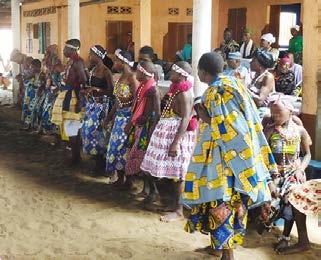
Provide capacity-building opportunities for instructors working in justice, social work and security force educational facilities, and certify them to teach new courses and share knowledge on implementing childfriendly practices in Togo

PARTNERS: Québec International Development Program, UNICEF Togo, WAO-Africa, Ministry for Social Action, the Protection of Women and Literacy (MASPFA), Ministry of Justice and Relations with the Institutions of the Republic, Child Protection Directorate (DGPE), National Academy for Social Education (ENFS), Legal Professions Training Centre (CFPJ)
ACCOMPLISHMENTS:
Updated the mapping report
Developed and validated a basic training kit for social workers
Held train-the-trainer courses at the National Academy for Social Education
Prepare a draft training kit for magistrates
BRIEF PROJECT HISTORY: From 2009 to 2013, the IBCR organised five regional workshops on the role of the actors of the child protection system. Chad expressed significant interest in professionalising the training offered to the justice, social worker, police, military and gendarmerie personnel. This led to a 2012 meeting in Lomé, Togo, between representatives from UNICEF and Chad’s police and gendarmerie to develop an action plan for including permanent and mandatory child protection and children’s rights courses in the national police, gendarmerie and magistrature schools. The action plan laid the groundwork for the IBCR to undertake a multi-year initiative for improving child protection in Chad, with financial support from UNICEF. The first step was to map and assess the child protection system, then to offer courses and develop training materials for security forces.
GOALS:
Strengthen the child protection environment by mapping the child protection system in a post-conflict context, and ensure the longterm availability of training for police officers, gendarmes, judges, military personnel and social workers in the Republic of Chad .
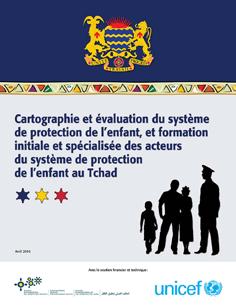
PARTNERS: UNICEF and Chad’s Department of Social Action, Department of National Solidarity, Department of Families, the Minister Delegated to the Presidency of the Republic in Charge of National Defence, Veterans and War Victims, Department of Interior Affairs and Public Security, Department of Justice, Department of Public Service and Labour, Department of Human Rights and Basic Freedoms, Judicial Police Directorate, Public Security Directorate, Child Services Directorate, General Directorate for National Constables, Child Protection and Judicial Follow-Up Directorate, Political Affairs and Civil Status Directorate, National Police School, Association of National Constable Schools, National Judicial Training School, National Sanitation and Social Officers School
ACCOMPLISHMENTS:
Updated and finalised the mapping and assessment report on the child protection system, and provided training to persons whose work involves protecting children’s rights This report now includes the social service and military professional bodies
Developed a training kit for magistrates
The IBCR is currently discussing the possibility of a third project phase with authorities in Chad and UNICEF The third phase would involve providing assistance to magistrature instructors and schools, and developing a training kit for social workers
BRIEF PROJECT HISTORY: The IBCR defines advocacy as a process aimed at influencing public positions, decisions and policies in order to efficiently promote and protect children’s rights. Thus, an advocacy strategy involves having a discussion centred on networking, institutional support, the establishment of a constructive political dialogue, and awareness. To encourage decision-making that is based on a systemic and integrated approach to children’s rights, the IBCR has participated in public consultations organised by the Government of Québec and the Government of Canada to discuss major trends and issues relating to national solidarity. The IBCR is therefore committed to taking part in discussions about directions and objectives meant to inform the federal and provincial governments on international action to be taken, as well as actively participating in the advocacy process on a national level and in an evolving institutional environment.
Consultation with the Québec Ministry of International Relations and Francophonie (MRIF):
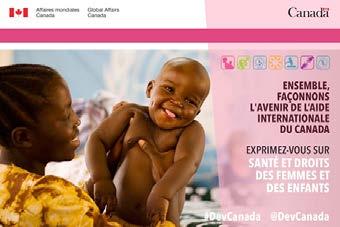
International solidarity is a very important issue for the MRIF . Québec must commit to attaining the sustainable development objectives adopted by Member States of the United Nations in the shared fight against poverty, inequality and climate change Since the adoption of Québec’s last international policy in 2006, many things have changed on the international stage Québec needed to review how it wishes to be involved in new international issues that concern governments, the United Nations, civil society organisations and its own citizens With this in mind, in the fall of 2016, Québec’s International Relations and Francophonie minister, the Honourable Christine St-Pierre, met with institutional and civil society representatives who are active in foreign countries in order to discuss their issues, concerns and vision for Québec’s international policy –one that would be modern, cohesive and inclusive As an expert in human rights protection, the IBCR participated in the workshop that focused on international solidarity and shared its esurience and vision
Renewal of the political framework and financing of the Government of Canada’s international aid: While significant progress has been made on sustainable development and poverty reduction plans, the complexity and evolution of new challenges and opportunities have obligated the Government of Canada to adapt its approach A review and public consultation process took place from May 18 to July 31, 2016, to renew the political framework and financing of Canada’s international aid This initiative, spearheaded by the Minister of International Development and La Francophonie, aimed at determining a better way to focus Canada’s international aid to help those most vulnerable, while also supporting fragile states . Global Affairs Canada developed a series of strategic consultation sessions to support the review process, including a session entitled “The Health and Rights of Women and Children,” which focused on the well-being and empowerment of children and youth . The event, which was held in Toronto, welcomed more than 70 representatives from non-governmental Canadian organisations, including the IBCR, whose Director General was invited to open the consultation, as well as Plan Canada, and to deliver the opening speech
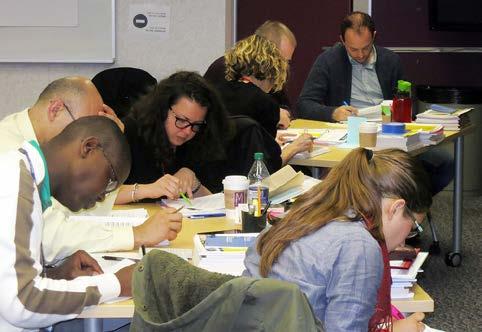
BRIEF PROJECT HISTORY: since 2012, the IBCR has been the sole organisation to provide training on children’s rights to employees of Global Affairs Canada. Ever since the Department of Foreign Affairs merged with the Department of International Trade in 2014, the target audience for these courses has included international development experts as well as agents in charge of consular, political and economic affairs. The course covers issues such as child participation, child protection systems, international law concerning children’s rights, Canada’s commitments and policies affecting children, logic models and performance measurement frameworks. It includes workshops and exercises designed to help participants apply a child-centred approach when carrying out development work and planning Canada’s foreign policy.
GOALS:
Develop practical, up-to-date courses allowing participants to gain technical skills
Co-lead three-day courses, in English and French, to enable participating public servants to discuss the technical, thematic and standard components of children’s rights
PARTNER: Global Affairs Canada
ACCOMPLISHMENTS:
2 courses were offered in Gatineau
Nearly 30 government employees and 4 IBCR team members received training
6 modules were reviewed and updated
The courses offered this year were part of the activities surrounding Canada’s new international development policy Five modules were developed last year to give government employees the prerequisite knowledge to participate in an online programme The IBCR completed the process this year and supported the translation of the course content into English The online courses are expected to be ready for the upcoming 2017-2018 session
In addition, the IBCR led two three-day courses and continued its capacity-building exercises with the department’s employees now that the Canadian government is paying increased attention to children’s rights Once the online course is introduced, the in-class course will be condensed to two days Thus, the IBCR has revised its materials and modules for in-class sessions and has adjusted its approach and content as it prepares for the launch of the online course
Training on children’s rights, Global Affairs Canada, Gatineau
BRIEF PROJECT HISTORY: “Social Service Workforce Training in the West and Central Africa Region,” a 2014 mapping report on social work education produced by the CPC Learning Network, found that there is a wide variation in the offering and quality of social work education available in East and West Africa. Based on the study’s recommendations, UNICEF, the IBCR, Terre des hommes - Lausanne (TDH) and Service Social International (SSI) agreed to undertake an inter-agency initiative to enhance social work in the region operating under the name Groupe régional sur la protection de l’enfance (GRPE, or Regional Group for Child Protection). As part of this joint project, an initial meeting was held in Dakar in December 2014. Nine schools/universities from Benin, Burkina Faso, Côte d’Ivoire, Ghana, Guinea-Bissau, Mauritania and Senegal took part. Other GRPE members, as well as the Commission of the Economic Community of West African States, were also invited to participate in the workshop. This workshop was the first step toward creating a regional network for strengthening human resources and the social services offering in West and Central Africa. Among other things, it led to the adoption of a roadmap. Partner consultations then took place in Benin, Burkina Faso, Burundi, Chad, the Democratic Republic of the Congo, Guinea-Bissau, Mali, Mauritania, Senegal and Togo. Subsequently, a second regional workshop was organised to support the development of essential skills for social workers with the help of key stakeholders in each country. In April 2016, eight African delegations met in Cotonou, Benin, for the Second Regional Brainstorming Workshop to establish a shared framework on essential skills for social workers and professional development in the area of child protection within West and Central Africa.
PARTNERS: UNICEF (Regional Office for Central and West Africa), Terre des hommes, Service Social International, UNICEF Benin, UNICEF Togo, MAEJT (Benin, Burkina Faso, Senegal), Commission of the Economic Community of West African States, the ministries of social action from the participating countries, social worker training schools, CRS-4Children, Enda, MAREM, WAO-Africa, Carrefour d’écoute et d’orientation, Association Keoogo
“The Bureau’s work must be done, not only by your institution, but also by other institutions, because children are the future of humanity Children are a target that must be surrounded and protected . Your institution does good work, and that work should be supported by the entire international community ”
Mikael Kpandi Djobo General Manager, Togo National Police School“We are working on this project with the IBCR to provide child protection training to defence and security forces in French-speaking Africa We were struck by the organisation’s profound knowledge of the problems, approaches and solutions related to child rights and protection In Nigeria in particular, the IBCR’s professionalism and flexibility have made it possible to bring together partners from all backgrounds and obtain their support, which is essential for successfully implementing the project and taking into account the realities in the field From evaluating training courses to developing toolkits, holding train-the-trainer sessions and attending the first in-school classes, the IBCR has proven to be both thorough and perseverant Thanks to their work, child rights training modules have been added to security and defence force schools in Niger ”
The objectives of the second regional workshop were to:
1 Share the results of the different national consultations held since December 2014
2 Identify avenues for enhanced collaboration, coordination and synergy between the different key groups of social work stakeholders in West and Central Africa
3 Revise the roadmap for strengthening social work (developed during the December 2014 workshop) and initiate brainstorming on essential skills for social workers in West and Central Africa

8 participating African countries: Benin, Burkina Faso, Burundi, Chad, the Democratic Republic of the Congo,Guinea-Bissau, Mali, Mauritania, Senegal and Togo 6 essential skills, 24 knowledge areas, 35 aptitudes and 20 attitudes were identified and adopted
In addition to sharing and talking about the results of the national consultations, the workshop allowed participants to broaden the discussion on the various social stakeholders and their cooperation A proposed framework of essential skills was validated The meeting culminated in the adoption of documents to track the implementation of the recommendations, national action plans in each country and a regional roadmap All of these documents were included in a single report
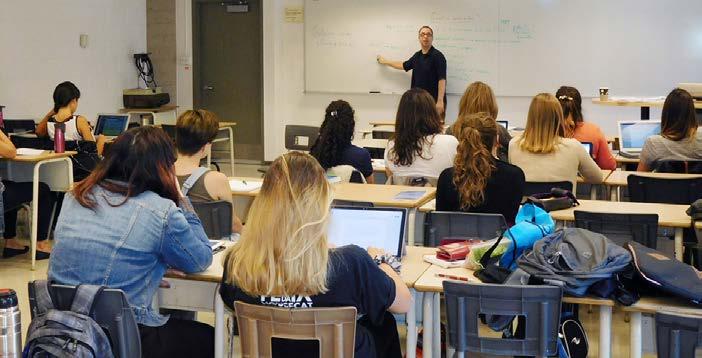
BRIEF PROJECT HISTORY: Since 2007, the IBCR has been giving several courses as part of the Université du Québec à Montréal (UQAM) summer school programme. Each year, the IBCR gives courses on: children in armed conflict, international mechanisms for child protection, mapping UN and international civil society players working to promote and protect human rights within schools, promoting peace, conflict resolution, protection of civilian populations, and the process of disarmament, demobilisation and reintegration. This experience prompted the IBCR to initiate further discussions with UQAM and set up a summer school entirely dedicated to the protection and promotion of children’s rights.
PARTNERS: Université du Québec à Montréal (UQAM)
OBJECTIVES: The course serves as an introduction to the various aspects of children’s rights protection—legal, political, security, and social—and to the many issues field agents face in Québec, Canada, and abroad, including volatile situations
The course aims to:
Provide practical project management knowledge to participants by presenting appropriate tools: genderspecific approach, results-driven management, and advocacy techniques
Raise awareness about emerging issues surrounding child protection and about key players working in this field, both locally and internationally
“Captivating, from beginning to end ”
“An interesting interactive course . ”
“Practical, insightful, and efficient workshops ”
“Nice presentation and relevant field approach Great!”
“Speakers had personal experience to share, and were available and generous ”
“An enriching week that increases awareness ”
The course on international and comparative protection of children’s rights included lectures, workshops, further reading and discussions with professionals More than 20 students from UQAM’s Faculty of Political Science, other faculties and other Québec universities (CRÉPUQ) were able to familiarise themselves with the issues surrounding child protection, both in countries facing a humanitarian crisis and those considered as being politically stable
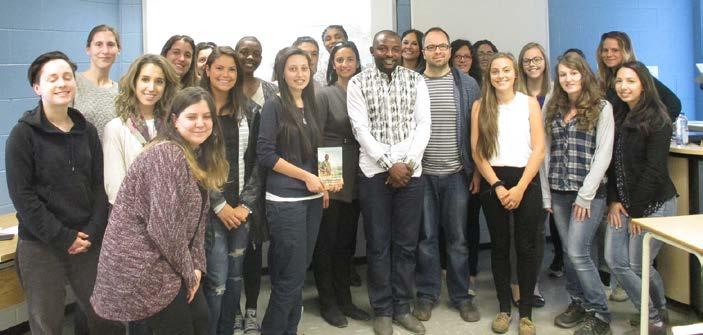
A large number of experts were on-hand for the second edition of the summer school, including IBCR project managers, the former UN Special Rapporteur on the sale of children, child prostitution and child pornography, directors from Doctors of the World Canada, the Québec Commission on Human and Children’s Rights, ECPAT Guatemala, the Child Protection Policy senior advisor for Global Affairs Canada, a Moroccan child psychiatrist, and the chairpersons of CHS Alternativo in Peru, Consantia Responsabilité Sociale Inc Canada and the Public Bodies Appeal Tribunal in Mauritius
22 students
24 experts from 11 countries
A major conference was organised at the summer school featuring the IBCR’s chairperson, Ms Najat Maalla M’jidk, as the key speaker Nearly 40 participants attended the conference, which focused on the sexual exploitation of children and lessons learned after having spent six years as a Special Rapporteur
The IBCR’s follow-up, assessment and learning strategy enable the organisation to measure and assess, in a systematic and structured manner, the performance of its ongoing projects . Information and lessons learned taken during and at the end of a project are now regularly used by programming teams to determine next steps and to positively influence the development of new projects The IBCR pursues a two-fold objective: learning lessons from projects currently underway and taking stock of past interventions
A first phase of retrospective assessments, called “ex-post,” aimed at analysing the impact of the IBCR’s intervention in September 2016, which will continue into 2017 The first phase focused mainly on capacity building projects with respect to children’s rights and child protection for defence/security forces and legal personnel in three countries: Côte d’Ivoire, Niger and Burundi .
Within this context, the IBCR travelled to Côte d’Ivoire for about ten days to perform an ex-post assessment of its capacity building project for Ivorian police officers and gendarmes in children’s rights carried out in 2012 and 2014 . The objective of the project was to support the Ivorian government in integrating a permanent and compulsory children’s rights and child protection training programme into police and gendarme training schools throughout the country The first assessment was carried out in collaboration with Universalia and in coordination with UNICEF and Côte d’Ivoire’s police and gendarme schools
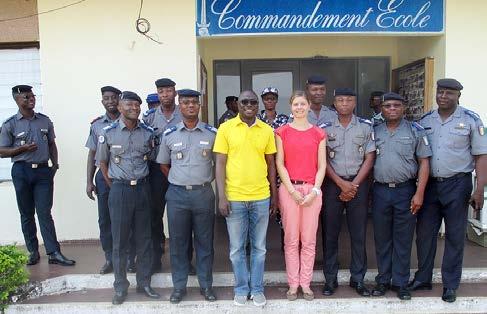
OBJECTIVES:
The IBCR had several objectives:
Question the meaning and the quality of actions taken and their consequences
Decide whether or not to continue or develop a certain type of intervention
Learn to adapt a successful intervention to another situation
Learn to avoid repeating mistakes
Learn to be more effective and improve practices
Ensure accountability to technical and financial partners
Inform target groups on how the programme is benefiting, or not, the community and it what ways
The IBCR also took this opportunity to question its internal capacities in terms of mobilising and managing technical, financial and human resources .
The assessment focused on the impact of the overall training sessions (continuous, specialised and initial) The IBCR met with key project stakeholders at the Abidjan and Daloa gendarmerie schools, as well as the Abidjan Police School More than 30 interviews were conducted with former members of the project’s steering committee and IBCR-trained instructors to gather data at the headquarters and in the field In addition, six discussion groups were organised with gendarme and police force students
The rigorous criteria and the methodology developed with Universalia and applied during the data gathering phase enabled the IBCR to obtain information which must now be organised, analysed and formalised in order to draw important lessons on the project’s imminent implementation, thus contributing to institutional learning
Information gathered during the interviews and discussions groups was used to answer assessment questions and inform the criteria retained At this stage of the assessment, the following preliminary results can be highlighted:
To date, all the instructors interviewed indicated the kits’ technical contents, as well as the training techniques taught to them, met their needs as instructors A needs analysis had been carried out in a participatory manner during the first phase of the project with the project’s stakeholders, as well as during the comprehensive assessment of the situation (mapping) which showed gaps in training

The integration of a permanent and compulsory children’s rights and child protection training programme in the country’s police and gendarme training schools was the project’s main objective Thus, the IBCR was happy to note that the course had indeed been included in the curriculum of these institutions Furthermore, 100% of the discussion groups featuring current police and gendarme students reported a change in their general perception of children, and indicated having a different attitude towards children and the community Students also said that the course would have a positive influence on their work as police officers and gendarmes Finally, instructors stated that they had become resource persons for working police officers and gendarmes who had not benefited from a course on child protection during their professional instruction
There is still work to be done in order to ensure the sustainability of these training courses More specifically, it is important to keep a permanent pool of certified instructors should other instructors be reassigned . Budget allocations must be planned for the printing and reproduction of training tools
The International Bureau for Children’s Rights posted revenues of CA$4,553,279 for the 2016-2017 period
Revenue – April 1, 2016 to March 31, 2017

During the 2016-2017 period, the IBCR’s activities were made possible by government contributions (57%), contributions from international organisations (24%), contributed services (14%) and private-sector contributions and other sources (5%), for a total revenue of CA$4,553,279 .
Expenditures – April 1, 2016 to March 31, 2017
Only 9% of the organisation’s revenues were spent on administrative costs, with the remaining 91% (CA$4,111,244) being used for programme development and implementation Of these programmes, 50% fell under Children and Justice, 29% under Exploitation and Violence Against Children; and 12% under Children and Emergency Situations In total, expenses (including fixed asset depreciation expenses) came to CA$4,546,809
Private sector and other CA$216,460
Contributed services CA$635,741
International organisation contributions CA$1,090,907
Government contributions CA$2,610,171
Treasurer: Marianne Limoges
Administration CA$400,758
Development and implementation: Children and Justice CA$2,248,630
Exploitation and Violence Against Children CA$1,308,401
Children and Emergency Situations CA$554,213
The organisation’s complete financial statements as at March 31, 2017 were audited by Deloitte S
a member of Deloitte Touche Tohmatsu Limited
To June 2016
Jean-Pierre Rosenzweig, chair; Andrea Querol, vice-chair; Richard Thérien, treasurer; Emmanuelle Tremblay, board member; Najat Maalla M’jid, board member; Mary-Anne Kirvan, board member; Luc Lavoie, board member; Benoit Van Keirsbilck, board member; Jean-Baptiste Zoungrana, board member; Joanne Doucet, board member; Shirin Aumeeruddy-Cziffra, board member; and Maria Eugenia Villareal, board member


From June 2016 onward
Najat Maalla M’jid, chair; Andrea Querol, vice-chair; Joanne Doucet, interim treasurer (until March 2017) and board member; Marianne Limoges, treasurer (March 2017 onward); Emmanuelle Tremblay, secretary; Shirin Aumeeruddy-Cziffra, board member; Jean-Baptiste Zoungrana, board member; Maria Eugenia Villareal, board member; and Rajae Sbihi, board member
Head office staff
Guillaume Landry, Vincent Dehon, Sarah Pisanu, Marie-Claude Rioux, Karine Ruel, Sabine Michaud, Céline Bouquin, Fatou Alfa Cisse, Henri Ariston Nzedom, Maryse Boulanger, Benoît Bouvier, Svava Bergmann, Mireille Chomi, Morgane Faber, Caroline Gendreau, Christine Hoang, Najla Khoury, Julie Lajoie-Potvin, Cathy Launay-Alcala, MariePierre Leroux, Tarik Marc, Loan Nguyen, Hubert Nzakimuena, Carla Perez, Paola Porcelli and Aranzazu Recalde
Field staff
Sergio Bahr, Guillaume Cailleaux, Martin Causin, Ericka Chavez, Victoria Cruz, Émile Darribere M’bumba, Virginia
Elizondo, Bertin Mbu, Pascal Mushamalirwa, David Ruiz, Cecilia Sanchez, Mamadou Tasfir Diallo, Denis Tapsoba Salfo, Maurice Somé, Gbato Soumahoro, Talato Tiemtore and Sabine Zongo
Odile Caron, Marie-Ève Houde, Benoit Gingras, Dominika Kianickova, France Levesque, Wendy Moran, Claudia Nuñez del Arco, Béatrice Pinot, Justine St Jacques, Malika Saher and Meryem Zhiri
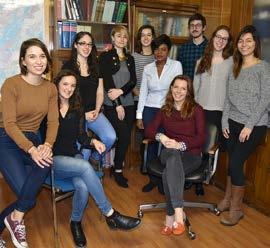
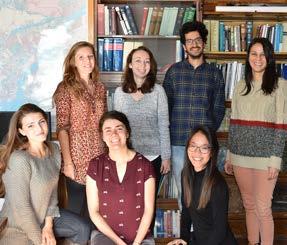
Anne Bourget, Odile Caron, Andréanne Dallaire, Isabelle Dufresne Lienert, Colombe Fourn, Mathieu Fraser-Arcand, Anika Gagnon, Kathryn George, Micol Glorioso, Mathilde Huguet, Bérénice Irakabaho, Évelyne Kayoungha, Shaida Koala, Marie Pier Kouassi, Amandine Lanneval, Yessica Lara Torres, Adelaïde Lascaux, Charlotte Lecompte, Naomie Léonard, Fannie Longchamp, Koudédia Mah Konaté, Anna Mahura, Blandine Maindiaux, Zoé Maugère, Alexandre Mesa, Lenka Mikulova, Wendy Moran, Morgane Mounsamy, Camille Noel, Noam Ohayon,

Emmanuelle Saulnier-Leclerc, Lucile Scherrer, Nabindou Traolé, Susana
Sarah Claude Vollelv and Véronique Williams
Mapping Report on the Fight Against Human Trafficking in Costa Rica
Status Report on the Child Protection System and Training for Police Officers, Legal Personnel and Social Workers in the Democratic Republic of the Congo

Training Kit on Child Rights and Protection for Students at the National School of Social Training in Togo
Training Kit on Child-Friendly Practices for the Afghan Police
Assessment Report on the Juvenile Justice System in Angola
IBCR Child Protection Policy
Mapping Report and Assessment of the Child Protection System and Training for Child Protection Workers in Chad (updated in 2016)


Thanks to the unwavering support and commitment of partners and donors from around the world, the International Bureau for Children’s Rights was once again able to advance its mission of promoting and protecting children’s rights this year The IBCR has also been privileged to have had professionals, interns and students generously offer their time and services towards the effective implementation of our programmes
The IBCR would like to thank all those who made it all possible through their invaluable support, generosity and trust.
Global Affairs Canada, United Nations Department for Peacekeeping Operations, Québec Ministry of Justice, Montréal International, Québec International Development Program and Université du Québec à Montréal
Alliance for Child Protection in Humanitarian Action, Amal pour la famille et l’enfant, Association of Women Lawyers of Côte d’Ivoire, Lawyers Without Borders Canada, Association Bayti, CHS Alternativo, Paniamor, Plan, Save the Children, Service Social International, Terre des hommes, UNICEF, Universalia, WAO-Africa and approximately 40 Canadian civil society organisations
Comité Central de Partage, Les œuvres Le Royer, Congrégation de Notre-Dame, Filles de Jésus, Filles de la Croix, Filles de Marie-de-l’Assomption, Fondation Émilie Jauron, Fondation Jeanne Esther, Fonds Marie-François, Institut de Notre-Dame du Bon-Conseil, Institut Jeanne d’Arc, Missionnaires Oblates de Saint-Boniface, Moniales Carmélites Déchaussées, Oblates Franciscaines de Saint-Joseph, Petites Sœurs de la Sainte-Famille, Robert Ascah, Sisters of Charity of St-Louis, Sisters of Charity of the Immaculate Conception, Sisters of Providence of Saint Vincent de Paul, Sisters of Saint-Joseph of Toronto, Sisters of St-Martha, Society of the Sacred Heart, Sœurs de la Charité d’Ottawa, Sœurs de la Sainte-Famille de Bordeaux, Sœurs de Notre-Dame-Auxiliatrice, Sœurs de Notre-Dame du Saint-Rosaire, Sœurs de Sainte-Croix, Sœurs de Saint-François d’Assise, Sœurs de Saint-Joseph de SaintHyacinthe, Sœurs des Saints-Noms de Jésus et de Marie, Ursulines and Valérie Morissette

HEAD OFFICE
805 Villeray Street, Montréal, Québec H2R 1J4 Canada

Tel + 1 514 932 7656 Fax + 1 514 932 9453 info@ibcr org www.ibcr.org
SATELLITE OFFICES

Costa Rica
Impactico Los Yoses
Del Instituto México
50 al Sur y 250 al Oeste San José Tel : + 506 8361 0405
Burkina Faso
Zone du Bois, 03 BP 7041
Ouagadougou 03 Tel : + 226 67 31 22 22
Honduras
Calle de la Salud, Colonia El Prado, Tegucigalpa Tel .: +504 3170-7951
ISBN : 978-1-928031-33-8
Democratic Republic of the Congo
15th Floor, William’s Residence Building
29|31 Ave Roi Beaudouin
Gombe (Kinshasa)
Tel : + 243 (0) 81 51 86 456
IBCR headquarters in Montréal